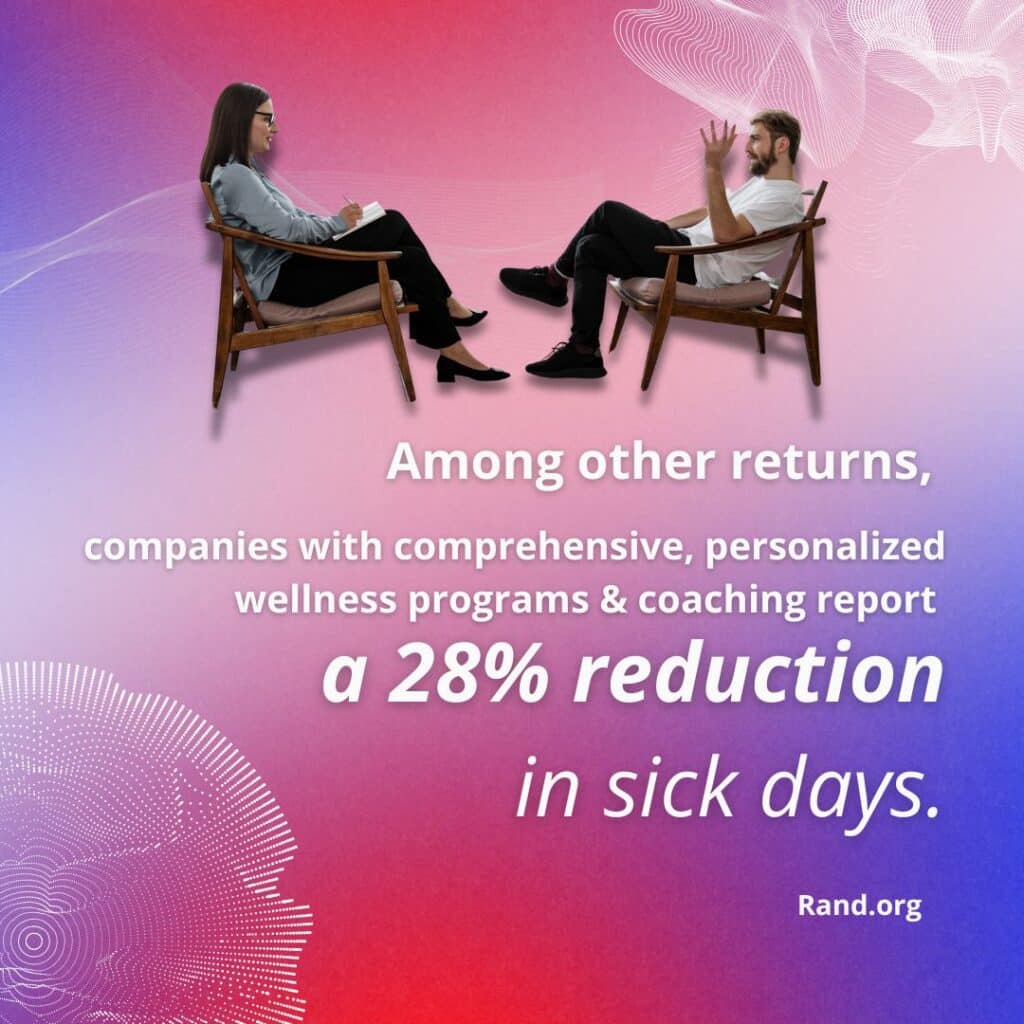Healthcare costs are rising. Employee burnout is at an all-time high. Because of this, many organizations struggle to support their team’s well-being. Team health is being prioritized by more employers every day, and it’s easiest to achieve with the help of a coach.
But what exactly is the return on investment, and why should your company consider this approach? Let’s find out and explore what else makes the investment worthwhile.
Workplace Wellness Challenges
Every year, workplace stress costs U.S. employers approximately $300 billion in absenteeism, turnover, and reduced productivity.
About 77% of employees say they feel burned out at work at some time in their careers. However, traditional wellness programs often have participation rates below 40%.
One-size-fits-all approaches fail to address individual health needs and motivations, which causes employee health and company performance to suffer.

What Do Team Health Coaches Do?
A team health coach serves as a dedicated wellness professional who works directly with employees to develop personalized health strategies.
Unlike traditional wellness coordinators who might focus solely on organizing events or managing benefits, health coaches:
- Create individualized wellness plans based on specific employee needs
- Provide ongoing accountability and support for health-related goals
- Educate staff on sustainable lifestyle changes
- Connect employees with appropriate health resources
- Gather valuable feedback on workplace wellness initiatives
Health coaches typically have professional certifications in health coaching, nutrition, exercise science, or related fields, allowing them to offer evidence-based guidance rather than generic wellness tips.
Financial Benefits for Employers
The financial case for investing in a team health coach is compelling. A study by RAND Corporation found that disease management programs, which often include health coaching components, can deliver a return of $3.80 for every dollar invested.
Companies with comprehensive wellness programs that include coaching report:
- 28% reduction in sick days
- 26% decrease in health costs
- 30% reduction in workers’ compensation and disability claims
Johnson & Johnson estimates saving $2.71 for every dollar spent on employee wellness, resulting in cumulative savings of $250 million over a decade.
Cultural Improvements
Beyond financial metrics, health coaches help build a stronger workplace culture:
- Employee engagement increases when staff feel their wellbeing is valued
- Team cohesion improves through shared wellness activities
- Leadership demonstrates tangible commitment to employee health
- Company values around wellness become action-oriented rather than abstract
According to Gallup, highly engaged teams show 21% more profit. By fostering a genuine culture of well-being, health coaches help create the conditions for this engagement to flourish.
Implementation Options
Implementing a health coaching program can be tailored to fit organizations of various sizes.
Small businesses (under 50 employees):
- Contract with a part-time health coach
- Utilize virtual coaching platforms
- Form partnerships with local wellness providers
Mid-size companies (50-500 employees):
- Hire a dedicated full-time health coach
- Develop department-specific wellness initiatives
- Create a hybrid in-person/virtual coaching model
Large enterprises (500+ employees):
- Build a team of specialized health coaches
- Integrate coaching with existing wellness benefits
- Develop location-specific coaching programs
The flexibility of health coaching programs allows companies to start small and scale as they see positive results.
Overcoming Common Concerns
Many employers hesitate to invest in health coaching due to several common concerns:
- Budget constraints: Health coaching can start with modest investments, such as a part-time coach or virtual services, with expansion as ROI becomes evident.
- Employee participation: Unlike traditional programs, personalized coaching typically sees higher engagement rates because it addresses individual needs and motivations.
- Measuring effectiveness: Modern health coaching platforms provide robust analytics on participation, behavior change, and health outcomes.
Finding the Right Coach
The success of your health coaching program depends largely on selecting the right professional:
- Look for credentials from recognized organizations like the National Board for Health and Wellness Coaching
- Seek candidates with experience in workplace wellness specifically
- Consider coaches with backgrounds relevant to your industry’s unique challenges
- Evaluate both technical expertise and interpersonal skills
The interview process should include scenario-based questions about how they would handle common workplace wellness challenges and opportunities to demonstrate their coaching approach.

Evaluating Program Results
To ensure your health coaching investment delivers results, establish clear evaluation methods. Firstly, set the goal to track changes in overall participation and engagement from the team.
Other than general performance and morale, it can also be beneficial to monitor developments in:
- Healthcare utilization and costs
- Absenteeism and presenteeism
- Employee satisfaction scores
- Biometric health markers (if appropriate)
After implementation, leadership should also collect feedback from the team with regular pulse surveys and one-on-one check-ins.
Future of Team Health
The field of team health coaching continues to evolve through enhanced tools and forward-thinking, personalized approached to wellness.
- Tech Integration: Wearables (like smart watches) and AI tools offer real-time data and personalized insights, helping tailor wellness strategies to individual needs.
- Holistic Approach: Focus is expanding to include mental health and financial wellness, creating a balanced support system for employees.
- Customization: Diverse workplaces require flexible and personalized wellness solutions.
Conclusion
Investing in a team health coach represents one of the most effective strategies for employers to improve productivity and create a workplace culture that attracts and retains top talent.
The evidence clearly shows that personalized coaching delivers superior results compared to traditional wellness programs alone. Ready to explore how a team health coach could benefit your organization? Mile High Fitness offers customized health coaching solutions for businesses of all sizes.



